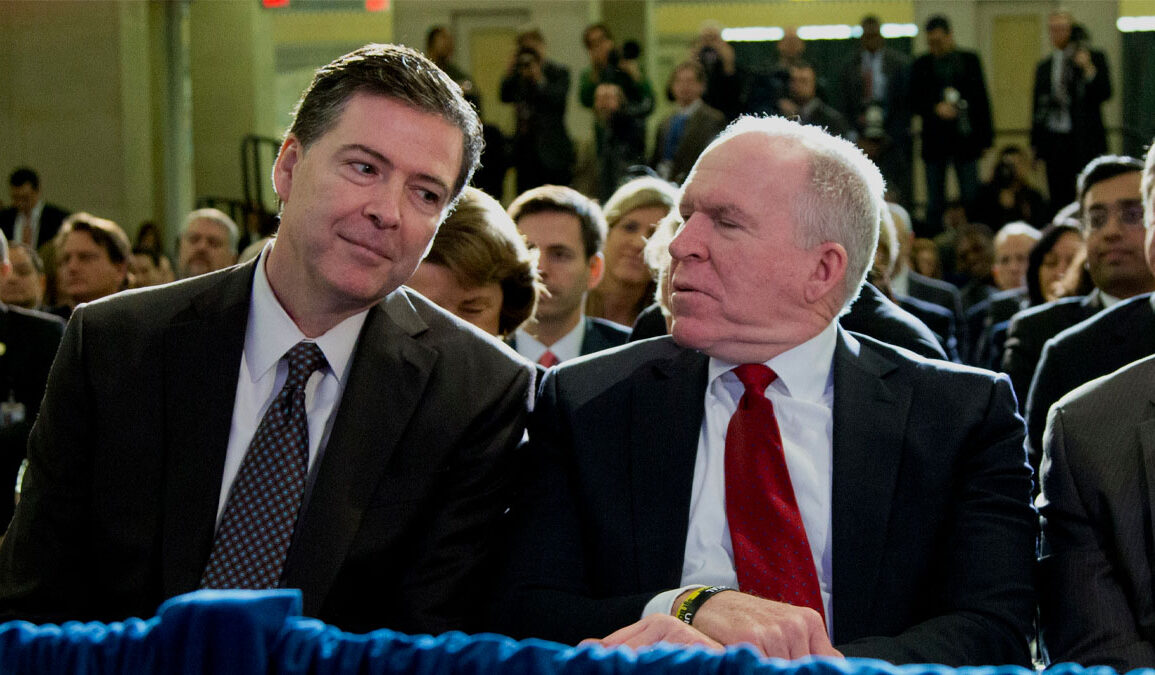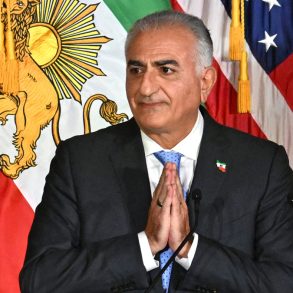The FBI has opened criminal investigations into former CIA Director John Brennan and former FBI Director James Comey, focusing on their role in the controversial Trump-Russia investigation that began during the 2016 presidential election. At the center of the probe is the use of the now-discredited Steele dossier, a political document funded by Hillary Clinton’s campaign, and whether Brennan and Comey knowingly relied on false or misleading information to launch a full-scale federal investigation into Donald Trump’s campaign.
A Criminal Referral Sparks New Scrutiny
The investigations follow a referral from CIA Director John Ratcliffe, who recently declassified a review of the 2017 Intelligence Community Assessment. The review sharply criticized the way the assessment was handled under Brennan’s leadership. In a statement on social media, Ratcliffe said the review “was conducted through an atypical and corrupt process under the politically charged environments of former Director Brennan and former FBI Director Comey.” He added that Brennan “risked stifling analytic debate” by signaling to agency heads that a decision had already been made before the assessment was even finalized.
The assessment concluded that Russian President Vladimir Putin sought to interfere in the 2016 election to help Donald Trump defeat Hillary Clinton. But the new review said this conclusion was reached through a rushed and politicized process that ignored internal objections and intelligence standards.
According to Fox News, Ratcliffe sent evidence of Brennan’s alleged wrongdoing to FBI Director Kash Patel, who then opened a criminal investigation. DOJ sources told the network that the probe is evaluating whether Brennan made false statements to Congress and whether the process he led was a deliberate attempt to create a politically motivated narrative.
Trump: Brennan and Comey “Crooked as Hell”
Former President Trump has responded strongly to news of the investigation. When asked by a reporter if he believed Brennan and Comey should be behind bars, Trump said, “I think they’re very dishonest people. I think they’re crooked as hell. And, maybe they have to pay a price for that.” He went on to say, “I believe they are truly bad people and dishonest people. So whatever happens, happens.”
Trump has long claimed that the Russia investigation was based on false pretenses and designed to derail his presidency from the start. He has repeatedly called it a “hoax” and a “witch hunt,” and has blamed both Brennan and Comey for leading what he calls a “coordinated attack using government power.”
White House Press Secretary Karoline Leavitt echoed Trump’s view, calling Brennan and Comey “disgraceful individuals” who “turned against our Constitution and our country.” She said in a televised interview that the Justice Department should “investigate and prosecute them if they did, in fact, lie to Congress.”
The Role of the Steele Dossier
A key piece of the investigation centers around the Steele dossier, a document compiled by former British intelligence officer Christopher Steele. The dossier was commissioned by Fusion GPS and paid for by the Clinton campaign and the Democratic National Committee. It alleged ties between the Trump campaign and the Russian government, including unverified and often sensational claims.
The dossier was used by the FBI to obtain surveillance warrants against Trump campaign aide Carter Page. Later reviews by the Justice Department’s inspector general and Special Counsel John Durham revealed that some information in the warrant applications was inaccurate or omitted, including the fact that the dossier had political origins.
The recent CIA review noted that the decision by agency heads to include information from the Steele dossier in the 2017 Intelligence Community Assessment “ran counter to fundamental tradecraft principles and ultimately undermined the credibility of a key judgment.”
Brennan has insisted he opposed including the Steele dossier in the intelligence assessment, saying in his memoir that he argued against it. However, other officials decided to append a summary of the dossier to the intelligence briefing provided to President Obama.
Brennan and Comey Respond
John Brennan has denied any wrongdoing and claims he has not been contacted by the FBI or the Justice Department. Appearing on MSNBC, where he is a paid contributor, Brennan said, “I am clueless about what it is exactly that they may be investigating me for.”
He added, “I think this is unfortunately, a very sad and tragic example of the continued politicization of the intelligence community, of the national security process. I’m really shocked that individuals are willing to sacrifice their reputations, their credibility, their decency to continue to do Donald Trump’s bidding on something that clearly is just politically based.”
James Comey has not commented directly on the investigation. However, he recently drew criticism after posting a photo on social media showing seashells arranged to spell out “86 47,” a number widely interpreted as a reference to removing Trump from office. The Secret Service used cellphone tracking to locate Comey and questioned him at his home. Comey later claimed he didn’t understand the meaning of the number and deleted the post.
Skepticism and Legal Hurdles
Some observers are skeptical about whether these investigations will lead to criminal charges. Much of the conduct under scrutiny happened in 2016 and 2017, which could fall outside the five-year statute of limitations for many federal crimes.
Special Counsel John Durham, who spent years investigating the origins of the Trump-Russia probe, ultimately did not charge Brennan or Comey. His investigation did result in charges against three individuals, including an FBI lawyer who pleaded guilty to altering information in a surveillance warrant. While Durham found serious misconduct, he did not conclude that senior leadership acted illegally.
Critics also point out that the investigations are happening under Trump’s administration, which has come under fire for allegedly using the Department of Justice for political purposes. Some view the probes as a way to settle scores rather than pursue justice.
Still, supporters of the investigation argue that accountability is long overdue. They say Brennan and Comey used their positions to advance a partisan agenda, using taxpayer-funded intelligence agencies to undermine a presidential candidate—and later a sitting president.
The investigations into Brennan and Comey reflect a larger battle over trust in U.S. intelligence and law enforcement institutions. While Trump and his allies argue that the system was rigged against him, others believe these investigations are a threat to the independence of those same institutions.
Whatever the outcome, the cases are likely to fuel ongoing debates about the use of federal power, the role of political bias in intelligence gathering, and the long-term consequences of the 2016 election.
For now, both men remain under investigation. Whether charges will be filed—or whether the story will again fade into political memory—remains uncertain. But one thing is clear: the fight over what happened in 2016 is far from over.
NP Editor: We are talking lying to Congress and using government resources to take down a political opponent. With great power comes great responsibility – and hopefully great punishment for abuse of that power.








